Yule. It ought to be a time of wonder and celebration; of gratitude and hope, that we will make it through the dark days of the winter solstice and can look forward to gentler times ahead.
It ought to be, but for many, it is a time of worry and a nagging dread.
In ancient times our non-comprehending forebears lived in consternation and fear that the ever-shortening days spelled doom, that the sun was leaving them, never to return. This was something to be anxious about. And for many of these struggling people of northern latitudes, this anxiety was altogether too true as they shivered in their huts starving and freezing to death from winter deprivation. But they huddled around their fires and prayed to their gods not to abandon them. And then a miracle happened – gradually the days began to get longer, and warmer. The signs of spring and returning bounty affirmed their midwinter hopes for rebirth and renewal.
There is no evidence that Jesus was born on December 25. There’s no mention of December (or any other month) in the New Testament. Well for goodness sakes, the Roman calendar wasn’t even an agreed thing in those days. December was only the tenth month of the year (Deci – ten, following Nove – nine, Octo – eight and Septo – seven). It was those narcissistic Caesars that adopted a twelve month calendar beginning with Janus (two-faced, looking forward and back) and Februarius (purging month!) rather than Martilis and Aprilis, and renamed mensis quintilis July (Julius) and mensis sextilis August (Augustus). No, nobody knows when Jesus was actually born (and some say there wasn’t even a Jesus) but all the priests knew about the winter solstice and the turning of days from shorter and shorter to longer and longer. The early Christian scribes and proselytizers knew this too and found it rather useful to have the birth of Christ coincide with already existing pagan and Roman beliefs: solstice celebrations for the rebirth of the world. The church relieved the faithful of their fears and gave them hope.
But in Northern Europe, a new rival for the affections of the people began to creep into the collective consciousness. Alongside the messiah of hope we now had the generous Saint Nicholas, he espousing the virtue of giving. But this wonderful virtue gave rise to an all-new kind of angst – what to give! And spawned another perturbation – debt.

I don’t know about you, but at some point in my emerging awareness – around age 9? – as I began to realize the social expectation of giving, all sorts of nagging worry and conflict set in. What should I buy for Dad, and Mom? Dad didn’t smoke cigars, and Mom didn’t wear perfume (and I had an intuition Mom wouldn’t like that perfume I could get at the local drug store). Moreover, I didn’t have much money. What about these cute squirrel salt & pepper shakers? I wish I could afford the thing I’d really like to buy – a new toaster. Feelings of inadequacy crept in. The pressure to buy things for others crowded out the wonders of Christmas – the rituals, the reverence, the joy of receiving!
Later, the internal angst of indecision and income deficiency intensified as I laboured to decide on just the right thing for that new girl in my life.
Despite being painfully aware of my own struggles with Christmas buying it never really occurred to me how my parents (and the girlfriend) may have struggled with Christmas buying too. And when I had kids of my own, their anguish in buying Christmas presents. Only later did I realize this anxiety is almost universal.
The internal conflict continued into my own parenting years. Marlene and I both wanted our kids to have a lovely Christmas, but one we could afford. We set a nominal budget and Marlene was a respectful buyer. The kids were always enthralled.

Nevertheless, I worried about how I would pay for all that stuff once the credit card bills rolled in in January. Is it any wonder February is suicide month in Canada.
In the early days, the only credit card we had was a Sears Card (it may even have been a Simpsons-Sears card). (I still have that account, though now it’s a Scotiabank card; I have a little memory shiver every time I use it and note the last four numbers on the card, the familiar 9195.)
I remember when the kids were maybe seven or eight, I’d take them off to Canadian Tire – they got to spend the accumulated Canadian Tire Money from a year of errands – to search for that ‘crystal’ sugar bowl, or maybe a Christmas ornament: Mom 1979. The natural shopper had no trouble finding something to give to her Mom, and learned early that her budget might not be limited to the Canadian Tire Money. The reluctant shopper struggled with his indecision. And I struggled too with worry about their [presumed] feelings of inadequacy.
I also worried about Marlene’s feelings of adequacy and autonomy shopping for something for me: she was a stay-at-home Mom and didn’t have money of her own, so bought gifts for me with our joint account. My angst for her also made me feel warm and protective. She didn’t seem to mind – she liked shopping and bringing happiness into the home, though I ‘m sure there were times she struggled.
(I might add, Carmen Beauty in The Philippines faces the same dilemma, and my feelings of empathy are repeated.)
Over time it gradually dawned on me that the magic of receiving a gift was not so much the quality and cost of the object but the time and energy and worry and doubt that the giver put in to bring that gift for me. Even now my eyes well up as I imagine Marlene, or one of the kids, venturing out to the plaza hoping to find just the right thing, picking something up, putting it down again as too expensive, or not quite my style or colour, trying again someplace else, feelings of discontent increasing, finally buying something, still hoping it was the right thing.
And then I think, did I express enough appreciation at the time. I wonder if they ever knew how my heart was wrenched by their efforts to please me.
It was just the opposite for me. I wanted to please Marlene but shopping for her was not so much wrenching as trying. I never enjoyed shopping – Christmas or otherwise – still don’t – and the prospect of shopping for something Marlene would like, and not scupper the budget, was not a welcome thing. And it wasn’t just the money and the indecision that weighed on me, it was also the time pressure. I was a busy professional in my work life and I never felt I had the time to devote to a thorough shopping expedition. It just added to my seasonal stress.
It’s gotten easier in my last few years, even though my family obligations have expanded rather than contracted. I no longer buy anything for my own adult kids but I do have six grandchildren I still want to give to. And I have five apos in the Philippines. I no longer have Marlene, but I do have Carmen. Carmen agrees with me that Christmas is for the kids, but I know she would really like those natural pearl earrings, only 29,000 Pesos. Ouch.
So, as the dark days of November draw a depressing curtain over my mind (only slightly alleviated by snow-covered grounds and Christmas lights in December), it isn’t the encroaching solstice that causes my angst, it’s the burden of Christmas giving.
Oh well, the season will be over soon and we can look forward to an even more promising, and angst-free holiday – Groundhog Day.
Doug Jordan, reporting to you from Kanata, Canada
© Douglas Jordan & AFS Publishing. All rights reserved. No part of these blogs and newsletters may be reproduced without the express permission of the author and/or the publisher, except upon payment of a small royalty, 5¢.
